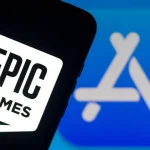

App store revenue model faces disruption as Epic Games and Samsung end legal battle over mobile distribution control
Key Takeaways
- Epic Games settles Samsung antitrust lawsuit while continuing litigation against Google, marking a strategic pivot in the company’s battle against app store monopolies
- $48 billion app store revenue model under threat as regulatory pressure and legal challenges target the industry’s standard 30% commission structure
- Global regulatory momentum accelerates with the EU’s Digital Markets Act and similar laws forcing tech giants to allow alternative app stores and sideloading
Introduction
Epic Games withdraws its antitrust allegations against Samsung Electronics in a settlement that reshapes the ongoing battle over app distribution control. The Fortnite creator filed the lawsuit accusing Samsung of collaborating with Google to suppress competitive app marketplaces through restrictive default settings on mobile devices.
The settlement represents a significant development in Epic’s broader legal campaign against platform monopolies. While the company continues its litigation against Google, the Samsung resolution signals a strategic shift in how Epic approaches its fight for open app ecosystems.
Key Developments
Epic’s lawsuit targeted Samsung’s “Auto Blocker” feature, which the company alleged discouraged users from downloading apps outside Google Play Store and Samsung’s Galaxy Store. The gaming company sought monetary damages and changes to Samsung’s platform practices.
Samsung defended its position throughout the litigation, arguing that Auto Blocker served legitimate security purposes without anticompetitive effects. The company maintained it would “vigorously contest Epic Games’ baseless claims” before reaching the undisclosed settlement terms.
The resolution comes after Epic’s major legal victory against Google in 2023, where a jury found Google’s Play Store and billing system constituted an illegal monopoly. This precedent strengthens Epic’s position in ongoing platform battles.
Market Impact
Google’s Play Store generated over $48 billion in consumer spending in 2023, highlighting the financial stakes involved in app store commission structures. Legal challenges and regulatory changes threaten to erode these revenue streams significantly.
The settlement reduces immediate legal costs for Samsung while allowing the company to maintain its current platform practices. However, the broader regulatory environment continues to pressure device makers and platform holders to open their ecosystems.
Epic’s legal strategy aims to launch its own app store across major platforms, potentially capturing market share from established players. This approach could fundamentally alter app distribution economics and developer margins.
Strategic Insights
The settlement reflects Epic’s pragmatic approach to platform battles, focusing resources on the most impactful litigation targets. Google remains the primary focus as the dominant Android platform controller, while Samsung represents a secondary distribution channel.
Samsung’s willingness to settle suggests recognition of the changing regulatory landscape and potential risks from prolonged litigation. The company can now concentrate on compliance with emerging regulations rather than defensive legal strategies.
Alternative app stores and payment systems gain momentum as regulatory barriers fall. This trend creates opportunities for developers to reduce distribution costs while challenging established platform revenue models.
Expert Opinions and Data
Industry analysts view Epic’s legal campaign as a catalyst for broader ecosystem changes. The company’s approach breaks new ground in challenging the Apple-Google app store duopoly that has dominated mobile distribution for over a decade.
According to Bloomberg, the settlement filing provides limited details about terms or future obligations. This confidentiality reflects the sensitive nature of platform control negotiations.
Developer community reactions remain mixed, welcoming reduced fees and increased distribution options while expressing concerns about platform fragmentation. Security questions arise as control decentralizes across multiple app stores and payment systems.
Consumer advocates anticipate benefits from increased competition, including more choices and potentially lower prices. However, the transition period may create confusion as users navigate multiple distribution channels and security protocols.
Conclusion
The Epic-Samsung settlement represents a milestone in the global shift toward more open app ecosystems. The resolution allows Epic to concentrate resources on its Google litigation while Samsung avoids protracted legal battles.
The business implications extend beyond individual companies to reshape platform revenue models and developer opportunities. The growing tension between platform control and market competition continues to drive regulatory and legal developments that will define the tech industry’s future structure.





